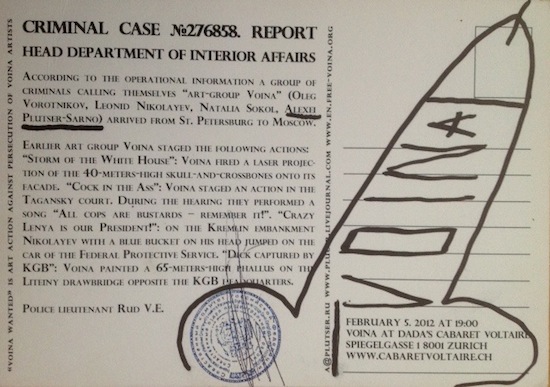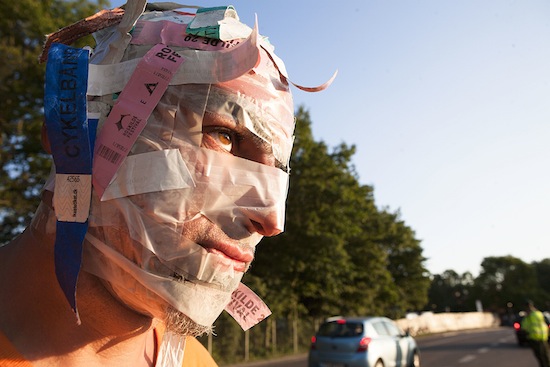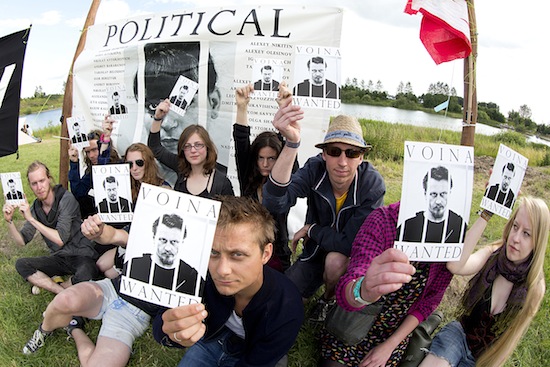When times were good under the last government some of us, and I include myself in this, naively believed that the most challenging seditious art, great insubordinate bands producing the noisiest revolutionary music, would only come around again in abundance when the shit hit the fan. A decade or so later and the gaping yawn that separates the haves from the have-nots has never been wider than it is right now, and yet this creativity driven by disaffection failed to materialise. Our desire to witness an insurgency of angry youth was neutralised by a swathe of middle class kids who could afford to mess around, taking the DIY ethic and rendering it benign. Suddenly our fabled insurrection looked as foolish as a belief in the Second Coming or the idea that Peace and Love on a global scale would be just around the corner, as the hippies convinced themselves at the end of the 60s.
Live under a proper totalitarian regime and things might be different, however. From Ai Weiwei’s staggeringly detailed and haunting dissident art to the gutsy raised middle finger of Pussy Riot to Vladimir Putin, these direct responses to oppression have served as some of the most audacious spectacles and statements of our times. In Russia in particular, things look pretty bleak right now for the rights of its people – especially in the LGBT community. You’d have to have been living under a rock not to have noticed what’s going on, and the international community now seems fully awake to the backward steps of the Russian Bear.
Stephen Fry is one of a growing number of high profile people who has spoken up, voicing eloquently the desire of many that Britain should boycott next year’s Winter Olympics in Sochi (David Cameron naturally suggests anti-gay prejudice will be better tackled by participation), while Barack Obama recently cancelled a meeting scheduled with the Russian President (even if this was almost entirely prompted by the politician throwing a protective arm around Edward Snowden) telling Jay Leno, "I have no patience for countries that try to treat gays or lesbians or transgender persons in ways that intimidate them or are harmful to them."
Voina, the art-prank collective that spawned Pussy Riot, are one of the main attractions at this year’s Roskilde Festival. Roskilde in Denmark has been in operation since 1971, and like Glastonbury in England, the old northern-European festival superpower is about more than just the music. Or at least that’s what the promoters seem very keen to try to convey this year.
If one was to compare it to any UK festival, I have to say it looks and feels a lot like Reading, though the difference is that Roskilde grew up with an anti-corporate ethos right from the beginning, and hats off to them for managing to maintain that same noncommercial spirit to the present day. It’s a non-profit organisation that employs around 50 people and relies on a wealth of volunteers. Before going there I assumed the Orange Stage was sponsored by the international telecommunications company, and when I noticed the pop artist Ron English had been invited to display his work next to the arena – which seeks to parody and lampoon advertising – I envisioned an embarrassing visual conflict of interests. The Orange Stage is so named, it transpires, because it’s the colour orange.
For my money, Ron’s art lacks any of the wit of a Richard Hamilton or a Lichtenstein (pics of Betty and Pebbles Flintstone under the titular ‘Queens of the Stone Age’ anyone?) and looks tailor made to adorn the bedroom walls of stoners in poster form up and down the land, but he has some interesting things to say about advertising, even if his antipathy doesn’t run as deep as one might have expected.
"Sometimes I get frustrated," he tells me, "because some of the brightest minds of our generation have been sucked up by the advertising industry. Because it’s very hard to make money at art, and if you want to be an artist in some way then sometimes that’s your only option, to sell products."
The same is true of music now. It used to mean you were a sell out…
"Now it’s the new radio," he laughs. "It’s like, ‘Oh good, you’ve got a commercial, congratulations, now we know your song.’ It’s bizarre when you think about it, and civilisations will look back and see all this great art about toothpaste and think, ‘Toothpaste must have been so cool’, when of course we know toothpaste is banal."
In the heart of Roskilde’s camping area is Dream City, an apparently free-spirited heartland of cooperation taking some of the spirit of Copenhagen’s Christiania, a 34-acre autonomous zone in the country’s capital, which incidentally sprang up the same year Roskilde did. For right wingers like the Danish People’s Party, Christiania is something rotten in the state of Denmark, supposedly rife with drugs and undesirables. The party is looking to stamp out the commune of around 650 adults and 200 children with the assistance of the government. Within the parenthesis of the festival, the occupants of Dream City get to act out their fantasies unencumbered, and they’re funded to do so as well. Around €20,000 is distributed among a bunch of collectives including some heavy metal enthusiasts, a Church of Beer and a fully operational post office, delivering letters to tents on site via bicycles.
Even kookier still is the Velvet State, a structure of pods with a stage at the front situated in the art zone, that houses an experiment called the Sensual Society, where participants act out various archetypes. "It’s a potential new world, a thought experiment, a radical premise, a world that is more sensuous and aesthetic," says our eccentric and delightfully spooky tour guide, stood outside the gates. We’re not allowed in, as there’s an initiation process where one is blindfolded and drawn on, and it can take a couple of hours before one can become a part of the audience. Some festival goers who came for Kraftwerk or Rihanna end up never leaving, at least until the end of the festival, and apparently it can be quite hard to readjust to the real world afterwards.
"So you’ll find different aesthetic archetypes there," she says, "like the Pink Narcissus, inspired by the gay porn movie of the 70s – some of you might know it – it’s a beautiful film, as well as the fantasist, the alchemist, the killer, the dictator, the strategist, the critic…"
Apparently some archetypes might die if the concept isn’t strong enough. "For instance, the idealist nearly died yesterday," she laments, before laughing wickedly. While the festival talks a lot about alternative community creation, she believes that at the campsites the communities are "quite autonomous – drinking beer and being crazy vikings. Some of the people coming here would never find an avant garde performance installation. Some of these people feel so spoiled and grateful to come in here and have this treatment and be part of this experiment with the performance."
It’s outside the Velvet State that I meet the Voina group. Yana Sarna is taking part in a panel discussion with other guests, including a doctor who joined the Occupy movement and a Turkish woman who relays the horrors of the situation in her country. Afterwards I approach Yana and ask if we can talk. I’ve been told that the best way to get an interview with Voina is simply by approaching them, and she says an interview is fine. Then Alexey Plutser-Sarno approaches and hands me a postcard, on which he kindly draws a cock in indelible black marker. Alexey doesn’t speak any English so I assume this is his way of saying hello. On the postcard is a picture of Oleg Vorotnikov, the joint founder of the collective (with his wife Natalia Sokol in 2005). The picture says "VOINA WANTED" and it’s the same image the group unfurled to the press at the start of the festival.

Now another banner is being unfurled. It says "FUCK HYPOCRISY". I ask Yana what it means. She tells me that I have to come back tonight at 8pm and all will be revealed, though she adds that it has something to do with the bank the festival deal with. I ask if we can do the interview in the meantime, but Yana requests that we do it via email as her and Alexey don’t want the English – which is of course their second language – to become misconstrued in any way. I agree.
Roskilde banks with Danske Bank. Some people on the internet appear to be angry with Danske Bank for loaning $50 million to Honeywell International, which produces approximately 85% of non-nuclear components for nuclear weapons in the US. "It is involved in simulated nuclear testing and the life-extension programme for the US navy’s Trident II nuclear missiles," says a pressure group called Don’t Bank On The Bomb.
I head back for the entertainment at 8pm and it certainly is just that: Alexey has his face wrapped entirely in gauze and tape except holes for his eyes and mouth, and members of the collective are cutting their wristbands off and slapping them as hard as they can onto his head. A crowd has gathered for the theatrics as the group very publicly expel themselves from the festival, and as they march off proudly they’re followed by people taking pictures.
I fire off a set of questions to Voina, and the answers land promptly in my inbox the next afternoon.
How did you come to hook up with Roskilde?
Alexey Plutser-Sarno: We were invited by our friend and Voina activist Denis Rivin.
Tonight you protested against Roskilde itself – with the banner "Fuck Hypocrisy" – because of the organisation the festival banks with. Can you explain more?
AP-S: We held five actions: "Political Prisoners", "Voina Wanted", "Fuck Apathy", "Europe SUX", "Fuck Hypocrisy". The last one was a protest against the situation where the Roskilde festival works with the Danske Bank. The Roskilde festival is a humanistic project. The Danske bank invests in anti-humanistic projects, including weapon industries.

Yana Sarna: By this action we wanted to help the festival to be more decisive when it comes to making necessary decisions and to stop cooperating with the Danske Bank. On the 6th of July, Voina activists cut off their wristbands. The Voina Group was glad to be thrown out of the festival territory, since the administration had already threatened to do it for an unauthorised action – "Voina Wanted" – in support of human rights and freedoms. We hit the cut wristbands aggressively onto the head of Alexey Plutser-Sarno, who symbolised hypocrisy. Colourful wristbands and bruises on the head of the artist created a piece of art.
Who was that on the massive ‘Wanted’ poster you unfurled on Thursday?
YS: Oleg Vorotnikov, activist of the Voina Group. The picture behind prison bars was taken when he was in jail after the action titled Palace Revolution. He spent three months in prison. British graffiti artist Banksy bailed him out. He collected $120,000 by selling his Choose Your Weapon works. Oleg was put on the international wanted list by Russian cops.
Vice called you ‘art pranksters’. Do you regard that a fair summation of what you do?
AP-S: After each action Russian cops start a new criminal case against the group. In those cases they call us vandals, hooligans and pornographers. We are proud to be called that. Of course, there is a lot of sarcasm and irony in our actions.
Do you continue a lineage that began with Guy Debord and the Situationists?
AP-S. Yes, we do. The Dada movement and Viennese Actionism are also very important for us. We learn a real protest from modern day anarchists.
Has life in Russia become harder since you formed in 2005?
YS: Yes, life has become harder. Religious fundamentalism and right-wing radicalism have flourished. Plus total corruption. The country moves to catastrophe.
Has Russia returned to the days of the Soviet Union?
AP-S: No, it hasn’t. It’s a new system, an African model: a group of corrupt oligarchs guarded by armed mafia.
Pussy Riot sprang from Voina – although there seems to be some confusion – was that Pyotr Verzilov’s Voina? You are still allied with Pussy Riot I take it?
YS: Yes, we do support Pussy Riot who once used to be Oleg’s followers. We held actions in their support. Pyotr Verzilov has nothing to do with Pussy Riot and the Voina Group. He was expelled from the Voina Group in 2009 for betrayal, ratting out activists to cops, stealing from activists and plagiarism.
Have Pussy Riot now distanced themselves from Verzilov? Because his wife, Nadezhda Tolokonnikova, is one of the women currently held in prison, right?
YS: He used to plagiarise the ideas of Pussy Riot, to steal money that was collected to help the girls and make statements on their behalves, even though he had no right to do so.
The head department of interior affairs in Russia wants you for staging: "Storm Of The Whitehouse", "Cock In The Ass" and the painting of a 65 metre high cock outside the KGB headquarters. Do these protests – aside from being great publicity stunts – achieve anything?
AP-S: We activated the youth. There are a lot of protest groups that appeared after Voina and were inspired by our group, such as Femen, Pussy Riot and others.
Are supposed ‘free’ countries becoming less free? The UK for example, which has brought in anti-religious laws and laws that are supposed to guard against terrorism…
AP-S: The tendency of stepping on human rights and freedom takes place all over Europe. This process is not as speedy as in Russia, but it still is going on.
You mock your "regime" – what would you like to see in its place?
YS: We want to see a horizontally organised society without police and violence from above.
Are you optimistic or pessimistic about the future?
AP-S: It doesn’t matter if we are optimistic or pessimistic. What matters is to understand the situation and keep on working and fighting.
And do you need to have a sense of humour to survive?
YS: Sense of humour, call of duty and social responsibility are important.
I mail Signe Brink Pedersen, project manager at Roskilde, and ask if she enjoyed Voina’s protest.
Signe Brink Pedersen: We enjoyed the protests and found it interesting and challenging both for our audience and the Roskilde Festival as organisation… Roskilde has a history of inviting minority groups and activist movements to contribute to our program. But it is not a dogma for us to invite activists, only if it is relevant to the program.
Is there an element of risk involved when a collective like Voina are so politically charged?
SBP: It is a risk we take, but what they are charged for in Russia they would not have been charged for in Denmark in the same way.
Then it’s time to ask about the Danske Bank. I have a number of questions. Did Voina’s misgivings resonate at all? Did they make anyone senior consider changing banks? Did she know anything about Danske Bank loaning $50m to Honeywell International, and is this the sort of thing an operation like Roskilde should be aware of? Signe says I’ll have to talk to the festival’s official spokeswoman, Christina Bilde, though when I mail Christina with the same questions, auto-reply informs me that Christina is on vacation until Thursday July 15. Christina has made no comment since the date she presumably returned work.
A lot happens in the next few weeks, including protests in London against Russian anti-gay propaganda laws. I drop Alexey another mail to see how he’s doing and ask a few more questions.
Is Oleg Vorotnikov in hiding in Russia? Does publicising his face on a poster raise his profile and make him more recognisable (for arrest)?
AP-S: Oleg knows how to stay safe. Besides, he and his family left Russia and now they live in a safe place. They "got retired" and are engaged in the art of photography; that is their main creative resource with Ukrainian and Italian photo-projects devoted to children’s portraits.
The British writer and broadcaster Stephen Fry has likened Putin’s treatment of LGBT people as similar to Hitler’s treatment of the Jews in the 1930s. Do you agree?
AP-S: Stephen compared the 1936 Olympic Games in Berlin, when rights of various minorities were being annihilated in Germany, and the 2014 Winter Olympic Games in Sochi, Russia, where rights of minorities are also being annihilated. I totally agree with Stephen that in such situations Olympic Games become an instrument of political support of totalitarian regimes. But I would compare these games with the games in Moscow in 1980, where political prisoners also rotted in prison.
What’s it like to be gay or lesbian or transgender inside Russia right now?
AP-S: They are devoid of elementary rights and freedoms as well as other minorities, dissenters and protest activists. They are not locked up in prisons much yet, but they are subjects of repressions, since the authorities support and spread homophobia. Western politicians don’t do anything to help activists in Russia. Our "Europe Sucks" action that we recently held in Roskilde is about this situation. European politicians suck our president off for gas, oil and vodka.
For updates on the Voina Group’s activities, Please visit their YouTube channel



